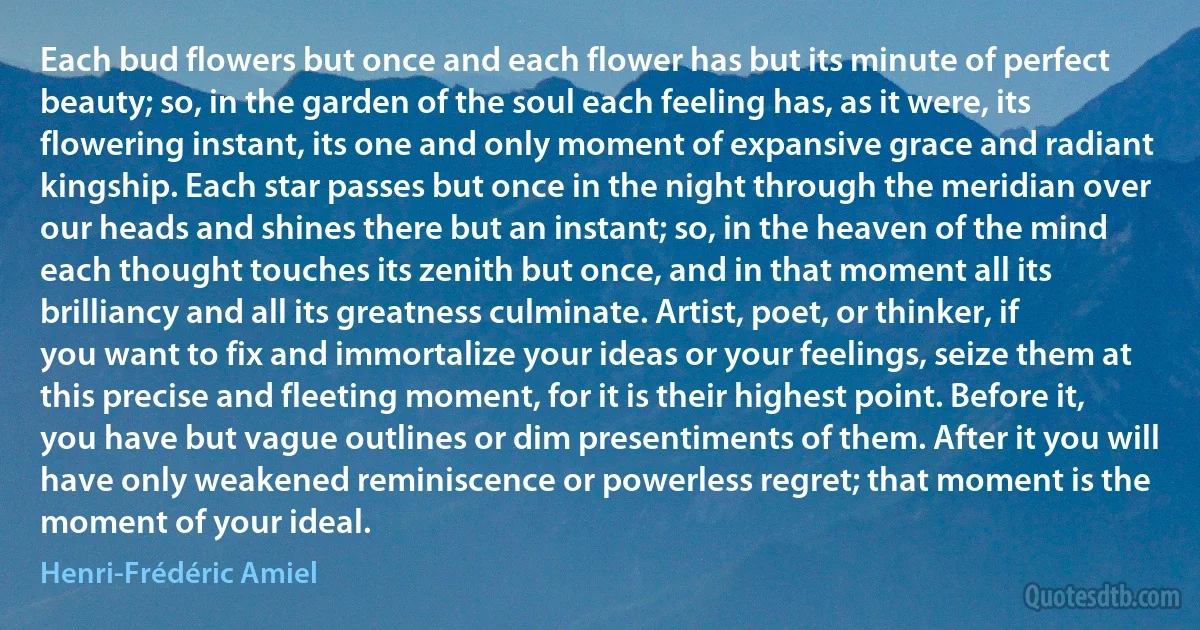
Each bud flowers but once and each flower has but its minute of perfect beauty; so, in the garden of the soul each feeling has, as it were, its flowering instant, its one and only moment of expansive grace and radiant kingship. Each star passes but once in the night through the meridian over our heads and shines there but an instant; so, in the heaven of the mind each thought touches its zenith but once, and in that moment all its brilliancy and all its greatness culminate. Artist, poet, or thinker, if you want to fix and immortalize your ideas or your feelings, seize them at this precise and fleeting moment, for it is their highest point. Before it, you have but vague outlines or dim presentiments of them. After it you will have only weakened reminiscence or powerless regret; that moment is the moment of your ideal.
Henri-Frédéric AmielRelated topics
beauty dim fix flower garden grace greatness heaven meridian mind minute moment night once perfect point regret reminiscence soul thought thinker vague zenith brilliancy headsRelated quotes
Your favourite virtue ... Simplicity
Your favourite virtue in man ... Strength
Your favourite virtue in woman ... Weakness
Your chief characteristic ... Singleness of purpose
Your idea of happiness ... To fight
Your idea of misery ... Submission
The vice you excuse most ... Gullibility
The vice you detest most ... Servility
Your aversion ... Martin Tupper
Favourite occupation ... Book-worming
Favourite poet ... Shakespeare, Aeschylus, Goethe
Favourite prose-writer ... Diderot
Favourite hero ... Spartacus, Kepler
Favourite heroine ... Gretchen [Heroine of Goethe's Faust]
Favourite flower ... Daphne
Favourite colour ... Red
Favourite name ... Laura, Jenny
Favourite dish ... Fish
Favourite maxim ... Nihil humani a me alienum puto [Nothing human is alien to me, Terence]
Favourite motto ... De omnibus dubitandum [Everything must be doubted].

Karl Marx
Demiurgus [said my father] was enamoured of refined, perfect, and sophisticated materials. We give precedence to junk. We are simply rapt by it, entranced by the cheapness, the paltriness, the tawdriness of the material. Do you understand,” my father asked, "the profound meaning of that weakness, that passion for gaudy tissue-paper, papier-mâ ché, coloured lacquer, straw, and sawdust? It is,” he said with a pained smile, "our love for matter as such, for its downiness and porousness, its unique, mystical consistency. Demiurgus, that renowned master and artist, hides it away, causes it to vanish behind life's make-believe. We, to the contrary, love its abrasiveness, its unruliness, its rag doll ungainliness. Behind each gesture, each movement, we like to see its exertion, its torpor, its sweet ursinality.

Bruno Schulz
Ikenobo Sen'o, a master of flower arranging, once said (the remark is to be found in his Sayings): "With a spray of flowers, a bit of water, one evokes the vastness of rivers and mountains." The Japanese garden too, of course symbolizes the vastness of nature. The Western garden tends to be symmetrical, the Japanese garden asymmetrical, and this is because the asymmetrical has the greater power to symbolize multiplicity and vastness. The asymmetry, of course, rests upon a balance imposed by delicate sensibilities. Nothing is more complicated, varied, attentive to detail, than the Japanese art of landscape gardening. Thus there is the form called the dry landscape, composed entirely of rocks, in which the arrangement of stones gives expression to mountains and rivers that are not present, and even suggests the waves of the great ocean breaking in upon cliffs.

Yasunari Kawabata
Print also created new literary forms and altered ideas of literary style. Medieval poetry was conceived for the ear, and each poem had to stand the test of recitation. In addition, medieval audiences were not always interested in the poet himself, since his work was known to them only through the interpretations of minstrels, who frequently rephrased poems to suit their own image and images. The printed page changed these conditions. Slowly, the printed poet came into a new relationship with his reader. He learned not to be so repetitive as his predecessors since a reader could be depended upon to return as often as needed to uncompromised passages. ...After the flowering of dramatic poetry during the Elizabethan Age, the printed page substituted for the theater, and millions of children came to know Shakespeare only through this form.

Neil Postman
And as for the close connection between philosophy and poetry, we can refer to a little-known statement by Thomas Aquinas in his Commentary on Aristotle's Metaphysics [I, 3]: the Philosopher is akin to the Poet in this, that both are concerned with the mirandum, the "wondrous," the astonishing, or whatever calls for astonishment or wonder. This statement is not that easy to fathom, since Thomas, like Aristotle, was a very sober thinker, completely opposed to any Romantic confusion of properly distinct realms. But on the basis of their common orientation towards the "wonderful" (the mirandum - something not to be found in the world of work!) - on this basis, then, of this common transcending-power, the philosophical act is related to the "wonderful," is in fact more closely related to it than to the exact, special sciences; to this point we shall return.

Josef Pieper
